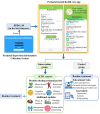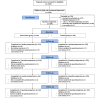Internet-Based Cognitive Behavioral Therapy for Preventing Postpartum Depressive Symptoms Among Pregnant Individuals With Depression: Multicenter Randomized Controlled Trial in China
- PMID: 40053801
- PMCID: PMC11920666
- DOI: 10.2196/67386
Internet-Based Cognitive Behavioral Therapy for Preventing Postpartum Depressive Symptoms Among Pregnant Individuals With Depression: Multicenter Randomized Controlled Trial in China
Abstract
Background: Women are particularly vulnerable to depression during pregnancy, which is one of the strongest risk factors for developing postpartum depression (PPD). Addressing antenatal depressive symptoms in these women is crucial for preventing PPD. However, little is known about the effectiveness of internet-based cognitive behavioral therapy (ICBT) in preventing PPD in this high-risk group.
Objective: This study aims to evaluate the short- and long-term effects of ICBT in preventing PPD among women with antenatal depressive symptoms.
Methods: Participants were screened for antenatal depressive symptoms using the Edinburgh Postnatal Depression Scale (EPDS) and randomly allocated (1:1) to either the ICBT group (receiving weekly online modules starting antenatally and continuing into early postpartum) or the control group (observed without treatment). Follow-up assessments were conducted up to 12 months postpartum, and data were analyzed using generalized estimating equations. The primary outcome was the prevalence of depressive symptoms at 6 weeks postpartum. A subgroup analysis based on the severity of antenatal depressive symptoms was also performed. The secondary outcomes included the long-term effects of ICBT on maternal depression, as well as its impact on anxiety, sleep quality, social support, parenting stress, co-parenting relationships, and infant development.
Results: Between August 2020 and September 2021, 300 pregnant individuals were recruited from 5 centers across China. No significant differences were observed in depressive symptoms at 6 weeks postpartum (P=.18) or at any longer-term follow-up time points (P=.18). However, a post hoc subgroup analysis showed that participants with antenatal EPDS scores of 10-12 in the ICBT group had a lower risk of developing depression during the first year postpartum (odds ratio 0.534, 95% CI 0.313-0.912; P=.02), but this was not observed for participants with more severe depression. Additionally, this subgroup demonstrated higher levels of co-parenting relationships (P=.02).
Conclusions: Among individuals with antenatal depression, ICBT did not prevent the development of PPD. However, ICBT may be a preferable option for those with mild to moderate antenatal depressive symptoms. Future research is needed to explore modifications to ICBT to address more severe depressive symptoms.
Trial registration: Chinese Clinical Trial Registry ChiCTR2000033433; https://www.chictr.org.cn/showproj.html?proj=54482.
International registered report identifier (irrid): RR2-10.1186/s13063-022-06728-5.
Keywords: antenatal depression; internet-based cognitive behavioral therapy; postpartum depression; randomized controlled trial.
©Chen-Chi Duan, Chen Zhang, Hua-Lin Xu, Jing Tao, Jia-Le Yu, Dan Zhang, Shan Wu, Xiu Zeng, Wan-Ting Zeng, Zhi-Yin Zhang, Cindy-Lee Dennis, Han Liu, Jia-Ying Wu, Ben Willem J Mol, He-Feng Huang, Yan-Ting Wu. Originally published in the Journal of Medical Internet Research (https://www.jmir.org), 04.03.2025.
Conflict of interest statement
Conflicts of Interest: BWM reports consultancy, travel support and research funding from Merck and consultancy for Organon and Norgine.
Figures



References
-
- Field T. Postpartum depression effects on early interactions, parenting, and safety practices: a review. Infant Behav Dev. 2010 Feb;33(1):1–6. doi: 10.1016/j.infbeh.2009.10.005. http://europepmc.org/abstract/MED/19962196 S0163-6383(09)00097-6 - DOI - PMC - PubMed
-
- Gelaye B, Rondon MB, Araya R, Williams MA. Epidemiology of maternal depression, risk factors, and child outcomes in low-income and middle-income countries. Lancet Psychiatry. 2016 Oct;3(10):973–982. doi: 10.1016/S2215-0366(16)30284-X. http://europepmc.org/abstract/MED/27650773 S2215-0366(16)30284-X - DOI - PMC - PubMed
-
- Wisner KL, Sit DKY, McShea MC, Rizzo DM, Zoretich RA, Hughes CL, Eng HF, Luther JF, Wisniewski SR, Costantino ML, Confer AL, Moses-Kolko EL, Famy CS, Hanusa BH. Onset timing, thoughts of self-harm, and diagnoses in postpartum women with screen-positive depression findings. JAMA Psychiatry. 2013 May;70(5):490–498. doi: 10.1001/jamapsychiatry.2013.87. https://europepmc.org/abstract/MED/23487258 1666651 - DOI - PMC - PubMed
Publication types
MeSH terms
LinkOut - more resources
Full Text Sources
Medical
Miscellaneous

